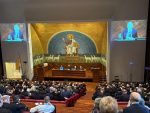Shortly after the Paris carnage I, perchance, read a column in The Times of India, by Jug Suraiya, an avowed agnostic/atheist. He asserted that such turmoil could never end because it was caused by religion, that had a powerful CEO – God!
Coming from an agnostic, such an accusation was not surprising. But publishing such views in a widely circulated daily could mould gullible readers into believing that indeed God is the author of all the bloodshed and mayhem in the world. Nothing could be further from the truth.
Let me be quite frank. Most of us mortals are not mystics like Francis of Assisi, Theresa of Avilla, John of the Cross or Angela Merici, who had direct experiences of God.
Most followers of various religions would also have little or no knowledge of their own sacred texts. Hence their experience and understanding of God would be largely determined by the godmen/women whom they encounter. Such religious leaders would probably propound their own pet theories, and possibly convey a terribly distorted image of the very nature of God.
Since most of us do not have the stamina for individual search and study, we end up seeing God as portrayed in popular religion, religious events and practices, or even calendar art! We may even manufacture a god of our own liking. That is the real meaning of idolatry, worshiping that which we ourselves have made. The golden calf was but a symbol.
This is so much more possible in today’s era of mass media, and the resultant mass hysteria. Actors who portray gods/ goddesses in movies or TV serials become identified with the deity itself; blurring fact and fiction, reel and real life. They even win elections based on such populist religiosity! A strange case of Bollywood manufacturing a “god” is that of Santoshi Mata. It is a purely filmi creation, not part of the Hindu pantheon! Another instance is the objection of various Shankaracharyas to Sai worship, temples and devotions. They aver that Sai Baba was not a god of the Hindus.
Religion, by its very nature, is a sensitive issue and highly inflammable. Here comes the rider. Most popular religion is a gross distortion, or out-of-the-context presentation, of what the sacred religious texts say. Jihad is a case in point. Islamic scholars are at pains to say Jihad cannot be used as a cover for political warfare or communal violence. But who cares to listen to the voice of reason if there is treason in the mind and hatred in the heart?
I myself am a practicing member of the Catholic Church. I have held national and international positions in the community, where I am both respected and feared. The common believer respects me, but the religious (ordained) leaders often feel threatened by my independent views, writings and autonomous acts; more so because I am not intellectually, socially or financially dependent on them.
I believe that the dichotomy between their orthodoxy and orthopraxis is the greatest stumbling block to the common believer experiencing God. Recall what Jesus said, “You lock the door to the kingdom of heaven in peoples’ faces, and you yourselves don’t go in, nor do you allow in those who are trying to enter” (Mat 23:13). This is not because they are bad, but rather because they are not good enough. They have not been able to rise above pious devotions, pilgrimages and processions to “be perfect, just as your father in heaven is perfect” (Mat 5:48).
We Christians are also largely influenced by the Indian psyche. Touch the feet of the Brahmin, and you will find Brahma. So too, a heavily clericalized Church is saying, “Follow the rules laid down by us and you will attain salvation. Don’t bother to look for answers. We have them all”. And we laity, the cattle class, the sheep, are more than willing to play ball. Never mind what Jesus had said about seeking and finding!
This is a gross distortion of truth. Truth! Aha, a key word. When Pontius Pilate was about to condemn Jesus to death he asked him, “What is truth?” Fortunately, Jesus did not answer. Any definition of truth would have been restrictive. In Christianity much emphasis is laid on love and service. Yet the great apostle St Paul could not define love. He ended up describing all that it was not (cf 1Cor 13:1-13); which isn’t quite the same thing.
When Christian children are given religious instructions they are taught that God is Omnipotent, Omniscient, Omnipresent etc. In the Old Testament, God comes across as jealous, angry and vengeful, besides being distant and hidden. Fortunately, with the advent of Jesus, God is revealed, and such false or dated perceptions have been jettisoned as extra baggage, by his life and teachings.
Interestingly, Jesus always referred to himself as the “son of man”, bar-e-nasa in his native Aramaic dialect. This term could be loosely translated today to “aam aadmi”. He did not claim to be God up there; but wanted his disciples to experience him as a human being down here. By his death, life and resurrection, he allowed others to gradually discover his divinity and subsequently address him as “Son of God”.
Christologists would agree with me when I say that Jesus himself grew in his own self-understanding from his experience of the “Father” when Joseph and Mary found him at the temple, then the declaration at his baptism and a further confirmation at the transfiguration. Then came the final act of surrender “It is accomplished. Into your hands I commend my spirit”.
At the Annunciation the divine was incarnated in the human; and on the cross the human was fused with the divine. Not by nails, but by a supreme act of will, that we mere mortals cannot even begin to comprehend; that agony in the garden that said, not my will but thy will be done.
Here again, a word of caution: human language and terminology are woefully inadequate to express the fullness of truth or love found in Jesus.
Whether Jesus was son of man, Son of God, or both fused into one, is not the subject of my discourse. His life and teachings are. When he was born in Bethlehem, the heavenly epiphany was of peace. In his final discourse to his disciples he promised them peace. After his resurrection, the first word he uttered to them again was – Peace.
Jesus lived and breathed peace, love, truth and service. He didn’t just preach it. This is the “God” that I believe in, and seek to follow; devoid of human labels and deft definitions. I don’ believe in Santa Claus, but I do believe in Jesus Christ. I look forward to welcoming him again as a babe in the manger this Christmas. He is my CEO for Peace Unlimited.
(The writer is the President of the Kanpur Catholic Association, and a Gandhian activist.)









